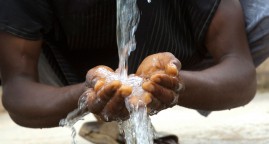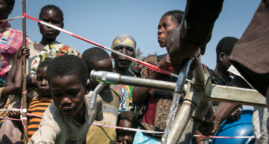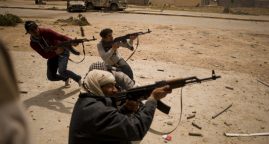Crisis and Conflict in Syria
Malteser International continues to expand medical aid for locals and displaced people in Syrian-Turkish border zone
The extremely insecure situation in Syria, featuring targeted attacks on medical infrastructure, makes humanitarian relief efforts extremely difficult, and poses a serious risk to the personnel that have remained behind. The level of need, however, remains immense.
The number of people requiring treatment at facilities in the area has risen dramatically since fighting around Aleppo in February caused thousands of people to seek safety in the Turkish border zone. Estimates place the number of internally displaced people living in the region at around 1.25 million, around half of whom are thought to be children under 16. Around 135,000 people are seeking protection in the border zone alone, around 50,000 of whom arrived during January and February.
To meet this need, Malteser International is expanding its medical aid measures for internally displaced people and local residents in the Aleppo region together with its Syrian partner.
Mobile Clinics and a Field Hospital
“The border between Syria and Turkey is closed in both directions,” said Janine Lietmeyer, Malteser International’s Middle East Manager. “The people there have to assume that they will need to remain on the Syrian side of the border. To ensure that at least a basic level of medical care is available to these displaced people and locals, we rapidly deployed two mobile clinics to the camps that have sprung up along the border since February, and procured additional supplies of essential medication. We are also planning to expand secondary health care facilities at the field hospital, which we constructed in the area with our partners in 2014. To cope with rising patient numbers, the present structure will be expanded to include five operating theatres, a larger maternity ward with two delivery rooms, as well as facilities to provide inpatient treatment and intensive care of forty patients. This will be supplemented by the creation of an additional mobile emergency unit for surgical interventions. These mobile solutions are especially important in a warzone with permanently moving fronts, said Lietmeyer. The four basic health facilities manned by doctors from our local partner organization are primarily employed treating patients with infectious diseases and war wounds. However, mother and child health is another important focus.”
Central blood banks
Malteser International is also engaged in the further expansion of two central blood banks in cooperation with our local partner, to supply the medical facilities in a region inhabited by around 1.5 million people with secure blood products for life-saving procedures. “Blood reserves for transfusions are extremely limited in Syria, but they are urgently needed for operations,” said Lietmeyer. “Alongside the central blood banks, our partner operates collection points for blood donation, processing and storage. We supply the equipment, and take care of the secure further processing and usage of the donations.”
Aid without borders
We are also expanding our aid for refugees, displaced people and locals in the countries neighboring Syria. We will begin operating a basic health unit from the premises of our rehabilitation center in Kilis, Turkey, while our mobile medical teams in Lebanon are set to grow further. The repair and reconstruction of additional health centers and the establishment of mobile medical teams is planned in northern Iraq, where Malteser International already provides medical treatment in the region’s refugee camps.
Article published on Malteser International website
Related Articles
World Water Day : Secretary-General’s Message for 2015
03/22/2015. This year, as the UN prepares to adopt a new post-2015 sustainable development agenda in September, World Water Day highlights the essential and interconnected role of water
DR Congo: UN warns of spike in displacement amid funding shortfall
03/09/2018. The United Nations migration agency is hoping that the upcoming donor pledging conference for the humanitarian crisis in the Democratic Republic of the Congo (DRC) will generate more financial support to cope with a spike in the number of people displaced by violence.
A Study on the Roots of Restraint in War
03/15/2017. A two-year research initiative launched by the ICRC to advance to understand how norms of restraint develop and spread through State armed forces and non-State armed groups.






